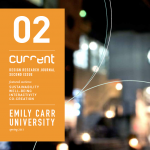Current Issue 05 is structured around the theme of Invocation, Intimation and Iteration, and according to Co-founding Editor, and Associate Professor, Deborah Shackleton, was designed to encourage the authors to think about the design process in terms of intuition and cognition.
This issue features articles written around the subjects of health design, sustainability, systems and interactivity. Along with student and faculty papers that support this theme, Current has invited contributions from information design authorities Jorge Frascara and Guillermina Noël, Design as Collective Intelligence – tools and strategies as they relate to the relationship between design and healthcare; and design strategist and author Ann Thorpe, whose Design Activism speaks to agency and actions as they apply to transformation and social change.
Focusing on the role designers and users play in the conceptual design process landscape, this year’s team interpreted the theme of ‘invocation, intimation, and iteration’ using a fun, bold, fanciful aesthetic. “The pop of neon, figure-filled illustrations, and process-inspired image layouts are balanced with a structured grid and austere typography,” says Jean Chisolm, Co-art Director and 2014 grad. “These design choices allowed the team to be experimental while still remaining true to the academic expectations of the publication.”
Issue 05 is the recipient of the Print Finalist Salazar Award, and received a runners-up nod from Graphic Design Quarterly.
Current Issue 04 is structured around the theme of “Sustainable and Generative Societies; Social Learning & Social Innovation,” and features articles by Liz Sanders of Maketools and Ohio State University, and Ezio Manzini from the Politecnico di Milano on sustainable and generative societies. Dr. Ron Burnett contributed a paper on the concept of audiences in art and design. Louise St. Pierre’s contribution reviews a 3-year collaboration between Emily Carr’s ecoTANK studio series and Powertech Labs. We also included interviews to the new SIM and HDL directors Kate Armstrong and Jonathan Aitken, and a review of one of the SIM centre’s latest industry research partnerships with Invoke Media for the development of an interactive cookbook for the Eat St. television series on Food Network. A number of student papers supporting this issue’s theme were also included.
Student praxis papers are developed by third year students in SOCS309 Design Research + Methods course led by Deborah Shackleton, or are submitted by fourth year students. The journal comes together in DESN324 Publication Workshop, a third year class where editorial and design teams work together to select and edit praxis papers, and to design and produce the multi-platform journal over the course of the Spring semester.
This year’s editorial approach focused on the power of illustrations and diagrams to communicate abstract ideas and produce a lively and unified visual narrative for the collection of essays and papers selected for this issue. A significant challenge in the development of the publication is both the simultaneous development of the journal for print and as an iPad app in a way that is cohesive and at the same time takes advantage of the unique affordances of each medium.
Current 03 iPad App
On the Convergence of Ethnography and Design: David Bogen explains how ethnographic research is no longer a parallel to design but a core element in the design practice and design education.
Importing an Ethics Model into the Creative Research: When working with human participants, proper ethics model is crucial to the protection of those individuals, the school and the creative practitioner. Glen Lowry, Julie York, and Lois Klassen write about the importance of a designated research and ethics board and how it gives Emily Carr a unique multi-disciplinary, practice-driven, and creativity-focused research culture.
Using Verticality Efficiently in Small Space Design: In this article, Bobbi Kyle and Nick Ng explore the problems and processes involved in conceptualizing interior architecture for single room micro-dwellings in urban Vancouver as part of the Ninety Square Foot Space project at Emily Carr University of Art + Design.
Youth in Transition: If you find that media preferences are fundamentally different between youth and their caregivers, what media would you choose? To whom should your design be directed? Are you leading the group or following their preferences? Jonathan Aitken introduces two case studies from the Health Lab initiative about building a community for chronic illness patients and finding a transition from children-centred health care to adult-centred care.
Lions Gate Hospital Foyer Project : Jessica Carson and her team implemented custom research methods to analyze issues of way-finding, traffic flow, space allocation and service usage, while engaging hospital stakeholders in the process to redefine the Lions Cate Hospital Foyer space.
Interview: Alexandra Samuel talks to Celeste Martin about the future of eBooks, their changing nature and their place in our culture. Designing The Vignellis:
Processes in eBook Production: Vivian Ziereisen and Kendra Stalder reflect on the relationship between printed books and eBooks and the processes involved in the creation of EPUB type eBooks.
Changing Views on Research: A Dialogue with Maria Latin: Glen Lowry’s conversation with Maria Lantin reflects on the cross-disciplinary practice between conventional academics and creative practitioners, and how collaboration provides a powerful foundation for the ongoing transformation of research across disciplines.
Illuminating Vancouver’s Neon: Paige Louie walks us through the creation of an interactive application for Vancouver’s Neon Signs that corresponds to the Neon Vancouver | Ugly Vancouver show curated by the Museum of Vancouver. The application becomes a secondary narrative for individual neon signs and aims at re-illuminating the existence of the Vancouver neon heritage.
Current is a multi-platform design journal that showcases creative, practice-based and applied research. Through a variety of forms and formats—interviews, case-studies, critical essays, reviews and photo documentation, we challenge researchers to represent their processes as iterative cycles of research and to skillfully navigate information-led/practice-led methodologies. Current is continually evolving exposition on the people and processes involved in design research. It is a platform for the cross-disciplinary, cross-sector professional communities of people with educational and professional interests in the currency of design thinking.


